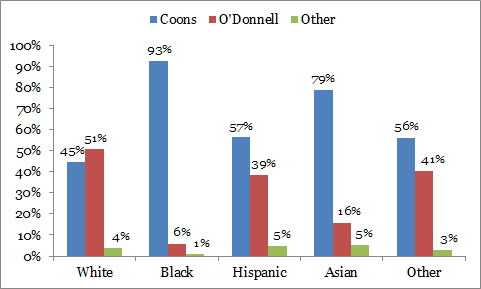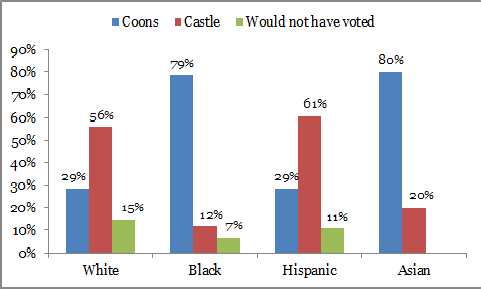
With the 24 hour news cycle it's easy to understand why many stories are forgotten and some are never told. This is especially true with regard to poll results. Almost every politico and news channel will cite a set of poll findings to lead or support a narrative, but they rarely go beyond the topline results.
The general phrases "Obama poll numbers drop," "Republicans blamed," and "Economic Fears Worsen" are about as helpful as a scratched up DVD if there's no data to explain the "why" part of the story.
Take for example the state of Delaware's mid-term election results. Recall Republican Christine O'Donnell [not] being a witch (BTW, Newt Gingrich's first ad of his presidential campaign was eerily similar), and Democrat Chris Coons being the luckiest politician in America?
Coons wound up winning the Delaware Senate seat by 17 percentage points over O'Donnell. In fact, Delaware was the only state whose Congressional delegation turned more "Blue" after the 2010 mid-term elections. True, Delaware only has 1 representative in the House, but change is change; just ask the former Republican Senator-in-waiting, and Delaware icon Mike Castle. Castle lost to O'Donnell in the Republican primary.
Most people, including me, attributed O'Donnell's failed Senate run to her weak campaign and candidacy. Indeed, the campaign was pretty bad, as was her preparation to be a U.S. Senator. But, there's another missing story to the election: race. Christine O'Donnell lost because African Americans and other racial-ethnic minorities turned out overwhelmingly for Chris Coons.
In Delaware, a state where two-thirds of the population are registered Democrats, and the racial composition is about 69 percent White, 21 percent African American, 7 percent Hispanic, and 3 percent Asian, the newly released 2010 National Election Pool Exit Poll Data show that O'Donnell easily defeated Chris Coons among White voters.
The exit polls show that Whites supported O'Donnell over Coons by a margin of 6 percentage points, 51 to 45 percent. White Independents also favored O'Donnell to Coons by the same 6 point margin, 49 percent to 43 percent. Yet, African Americans favored Coons over O'Donnell by a whopping 86 percentage points, 93 percent to 7 percent. This margin trounced any differences in candidate support due to age, education, income, and gender.
Hispanic and Asian American voters also supported Coons in large numbers. Delaware's Hispanic voters favored Coons to O'Donnell by 17 points, 56 to 39 percent, and Asian voters in the state favored Coons by 63 points, 79 to 16 percent.

Source: Delaware State Data from National Election Pool, 2010 Midterm Elections
The exit poll in Delaware also asked voters if the candidates for that day's Senate election where Castle and Coons who would they vote for. While many argued that the race would have been a lock for Castle, the overall numbers show a much more competitive election.
Overall, 45 percent favored Castle, while 42 percent favored Coons; a statistical dead heat with any margin of error of 2 percent or more. Also, thirteen percent of Delaware voters said they "would not have voted" if this had been the match-up.
This contest too varied heavily by race. Among Whites, Castle was favored by 27 percentage points over Coons, 56 percent to 29 percent; but, among Blacks Coons was favored by 69 points, 81 percent to 12 percent. Interestingly, Hispanic voters favored Castle 61 percent to 29 percent, but Asian voters favored Coons 80 percent to 20 percent.

Source: Delaware State Data from National Election Pool, 2010 Midterm Elections
Overall, racial-ethnic minorities favored Coons by 54 points, 73 to 19 percent. It's impossible to say who would have won a Coons-Castle election, but 15 percent of Whites said they would not have voted in that contest compared to about 7 percent of minorities. Regardless, the only reason the election would have been competitive is because of minority voters, especially African Americans.
It is also noteworthy that the same racial breakdowns exist for the House race between Democrat John Carney, and Republican Glenn Urquhart.
During a time where race and ethnicity are front and center for American politics, this story clearly illustrates the influence of African American and other racial-ethnic minority voters in statewide elections. Some may cast this analysis off as African Americans simply towing the Democratic line. However, that's a short-sighted and narrow view of this electorate, and given the increased turnout in 2008 some may want to think more strategically about gaining African American support.
It's not rocket science. In Delaware neither the Republican nor the Democratic candidate openly played racial politics by using racial code words, casting negative images of racial minorities in ads, or attacking on the basis of racialized statements.
Yet, while Coons openly listened to and reached out to African American voters -- particularly in Wilmington, DE, the largest hub of African Americans in the state -- and openly supported President Obama coming to Delaware to campaign for him, O'Donnell did very little to engage minority communities anywhere in the state, and openly criticized the president with personal attacks. In essence, O'Donnell turned out to be a better candidate for the media than for the Delaware electorate. It was simply poor political strategy.
The lesson for both Democratic and Republican candidates is that they might consider mobilizing minority group support through more targeted outreach. In-part the "Delaware Way" dictates retail politics: go out, meet everyone, kiss babies, and create a buzz. A changing racial-ethnic composition in the U.S. also suggests that candidates should not fear, or be uncomfortable, going into predominately racial-ethnic communities to communicate their ideas about how to fix problems. Tap issues that are relevant to their concerns, and tie them to improved well-being rather than simply talking about how bad things are.
For example, while most of the country (and media) complain about 9 percent unemployment, many African Americans would celebrate reductions to this level. Moreover, while some argue Obama has done nothing for the poor or African Americans (as if the two are synonymous), fighting for the extension of unemployment assistance for the disproportionately uninsured (the poor, and African Americans) certainly counts -- same reasoning applies for the Health care policies, education incentives, and equal pay policies passed under the current administration.
One last word on the profession. This type of analysis and set of conclusions is only possible because the National election Pool released their data publicly through the Roper Center at the University of Connecticut. This is a valuable resource for scholars, the media, and other organizations interested in understanding American public opinion. The exit poll numbers help us understand "why" Coons won, and "why" O'Donnell lost; but more importantly, they help us simply understand.